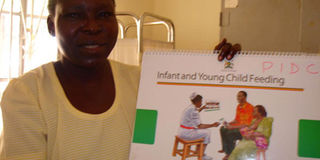Having HIV-free children is Atako’s passion

Atako says when mothers are given all the right information, they can make wise decisions. Photo by Simon Naulele
What you need to know:
- Agnes Atako is a trained nurse and HIV counsellor. However, she goes beyond this calling to help mothers who refuse to return for antenatal care after a positive diagnosis. In this case, she becomes their friend too.
It is 6am and Agnes Atako, 67, is busy preparing to go out and start working. By 6:30am, she is at Soroti Referral Hospital ready to take pregnant mothers through health education tips before they start receiving antenatal care and treatment.
Trained as an HIV counsellor in comprehensive management at the Aids Information Centre in Masaka, Atako is now a volunteer counsellor at Soroti Regional Referral Hospital attached to the Infectious Disease Clinic. She gives information to mothers on how to prevent mother-to-child transmission (MTCT) of HIV/Aids.
MTCT is when an HIV-infected woman passes the virus to her child during pregnancy, labour and delivery or through breastfeeding. Atako also supports women to adhere to antiretroviral drugs and practice safer infant feeding practices.
“I give appropriate counselling and support to HIV-positive mothers so that they are able to make informed decisions about their reproductive health,” says Atako.
Treatment
She says women who get pregnant but have not been taking their ARVs can take a short course of drugs to help protect their unborn babies, adding that a single dose of nevirapine is given to the mother at the onset of labour and to the baby after delivery.
Atako says she counsels HIV-positive mothers on the risks and benefits of different infant feeding options and helps them to select the most suitable option available to them.
She, however, adds that a baby who is fed on formula does not receive the special vitamins, nutrients and protective agents found in breast milk. She says a mother who is on ARVs can exclusively breastfeed for the first six months, and rapidly wean to avoid mixed feeding as it damages the lining of the baby’s stomach and intestines, thus making it easier to infect the baby.
Impact
Her intervention has created a lot of impact in the community, where a number of babies have been born without the virus as long their mothers heed her advice. She has also helped people living with HIV to live longer and be able to sustain their families, physically and psychologically.
“Mothers who having tested negative early on in the pregnancy can become infected if they continue having unprotected sex with their partners. I encourage them to always return for antenatal care so that effective HIV retesting is carried out.
Atako has been praised by a number of mothers who say sometimes when they are faced with challenge of disclosure and feel like not returning to the hospital, Atako visits them at their homes and gives encouragement.
“Many of us have managed to fight stigma and discrimination, because Atako tell us that having HIV is not a life sentence,” says Mary Margaret Aujo
Income generators
Jessica Amoding, a mother of two living in Soroti Town, says Atako has helped women start income generating activities and a culture of saving through clubs and SACCOS.
“We now eat well and our children are healthy because of the work she is doing,” says Melda Aguti, adding that mothers who did not even have a certain level of education can now read and write and also know how to administer medicine to themselves and their children.
Achievements
Atako goes beyond her profession to conduct Functional Adult Literacy (FAL) classes at the weekend on issues of personal hygiene, nutrition and sanitation. Right now, she says they have achieved 70 per cent success but hope that by 2025, they would have helped reduce mother to child transmission by 0.6 per cent.
“Our target is to stop HIV from getting through to the next generation by looking at the mother and her faetus,” she says.
Atako says after six weeks they test a child for HIV, then after every three months till he or she reaches the age of 18 months, where the last test is carried since it is believed that at this age, the child has developed its own immunity.
The youth
Besides health work, Atako has also formed women’s groups in Eastern Division where savings and personal hygiene, proper feeding especially on glow food (containing more vitamins) to protect the body’s immunity, is encouraged.
She also holds discussions every evening at 6pm with teenage girls where they talk about issues concerning STDS, and dangers of underage marriage, unplanned pregnancies and sex.
Atako says since parents fear to discuss sex-related topics with their children, she volunteered to start Change Agents, a group for young people, to discuss issues concerning their health including proper feeding. During the discussions, other medical experts are also invited. Atako also holds health talk shows on various radio stations in Teso.
Parting shot
Atako encourages women to form groups and embrace government programmes targeted at improving their income so that they can make motherhood safer.
At a glance
Atako was born in 1962 to the late Michael Apedu and Florence Atako in Angole Wera, Amuria District. She studied at Angole Wera Primary School, Ngora Girls SS and trained as a nurse at Nsambya Mission Training School from 1984-1986. She is a seasoned politician and a happy widow and has five children.




